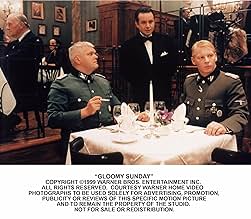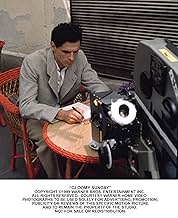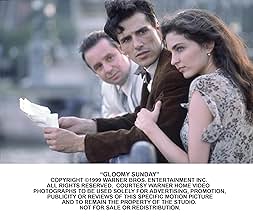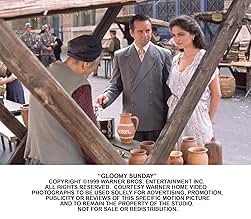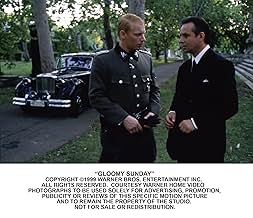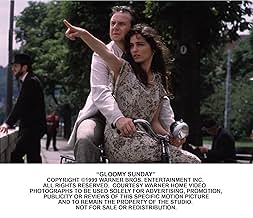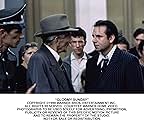Une chanson d'amour et de mort
Original title: Gloomy Sunday - Ein Lied von Liebe und Tod
IMDb RATING
7.8/10
8.7K
YOUR RATING
Follows three men who are in love with a beautiful waitress during World War II: an intellectual restaurant owner, a mysterious musician, and an erratic businessman.Follows three men who are in love with a beautiful waitress during World War II: an intellectual restaurant owner, a mysterious musician, and an erratic businessman.Follows three men who are in love with a beautiful waitress during World War II: an intellectual restaurant owner, a mysterious musician, and an erratic businessman.
- Director
- Writers
- Stars
- Awards
- 7 wins & 5 nominations total
- Director
- Writers
- All cast & crew
- Production, box office & more at IMDbPro
Featured reviews
...on why this film is doing well in communities unafraid to see subtitled films. For one thing, the beginning and ending create and resolve a compelling mystery (most of the film is a flashback). For another, you may or may not believe that a song could drive people to suicide, but you must admit it is a beautiful, sad and haunting melody. The story held my interest, as did the characters. The other obvious appeal was the opportunity to gaze endlessly at the incredibly lovely and angelic Erika Marozsán. I am female and straight and I could not get enough of looking at her; I could easily believe that she might inspire a piece of music that conveyed its composer's hopeless longing for her. (And he wasn't so hard to look at himself!) The only thing I couldn't figure out about Mr. Simpson's comments was what the film had to do with New Zealand. Now I know: nothing! :-)
According to the Los Angeles Times review of this film, "The song was actually composed in 1935 by Rezsö Seress, with lyrics by László Jávor, and did in fact accompany a number of suicides as Europe grew darker; Billie Holliday recorded a popular American version." So I guess it's not so far-fetched after all! Who knew?
According to the Los Angeles Times review of this film, "The song was actually composed in 1935 by Rezsö Seress, with lyrics by László Jávor, and did in fact accompany a number of suicides as Europe grew darker; Billie Holliday recorded a popular American version." So I guess it's not so far-fetched after all! Who knew?
10crisbob
Beautiful Budapest, end of the thirties. Lazlo Szabo a middle-aged jew Hungarian runs a chic restaurant with a beautiful waitress,Ilona who is also his mistress. One day they decide to hire a pianist, and it's Ilona who choose. And it's a good choice because the handsome young man, Andras, creates a wonderful mood on the premises. Little by little he falls desperately in love with Ilona and composes specially for her a song, very melancholic, and a bit misterious. He calls it " Gloomy sunday ". This song brings surprisingly a lot of suicides. The love-triangle functions pretty well until the time a german customer, Hans, who comes regularly in the restaurant falls in love with Ilona, without success.A few years later the german army invades Hungary, Hans is back as a highly placed officer and the jewish condition of Lazlo is going to complicate the lives of the four protagonists. This movie is a master- piece and I'd bet if the film had been produced in Hollywood with Stone, Douglas and Harrison Ford, directed by Cassavetes it would have gained several Oscars. It has all a movie fan can expect from a good film -and more. Beautiful scenery, very good story, marvelous music, talent of the actors, and even a bit of sex. I rarely see a picture twice on the same day. This time I did.
Fact and fiction combine to provide a delightfully entertaining film about a restaurant in Budapest. Clientele flocked there for the good food, the good music and I daresay the beautiful Ilona who served on the tables. What more could one wish for? Unfortunately the good times do come to an end when the Nazis sweep into Hungary and decide forthwith to eliminate the Jewish population.
Strange as it may seem the whole theme of the film revolves around a plaintive tune which first gained popularity in Budapest, later in Europe and then the whole world. The words to the song called "Gloomy Sunday" are full of despair.
The clients who came to the restaurant always asked for this particular melody to be played on the grand piano. It is played many times during the film. It is haunting and addictive. We find ourselves wanting to hear it again and again such is its hypnotic power.
All praise to Erika Marozsan who provides the romantic interest as Ilona in the story. I am told she is a newcomer to the screen, but as an actor she will surely be much sought after in the future. She is beautiful and her close-ups full of feeling. She has lovely hands that caress a lover's face with such gentle charm. She is much admired by Lazlo (Joachim Krol) owner of the restaurant and also by Andras (Stefano Dionisi) newly appointed pianist and composer of "Gloomy Sunday".
All goes well for the threesome until the arrival of a Nazi officer (Ben Becker) who takes a fancy to Ilona despite her constant rebuttals. In their position of power Nazis have the means of disposing of people who stand in their way.
This is a film of contrasts. First we have the beautiful setting which is Budapest, romantic songs and people in love. Then we have the Nazi occupation, loss of freedom and threats of Auschwitz.
This film must be seen to the end. There is an amazing twist of Fate in the last few minutes and it seems to me that at last in some remarkable way justice is seen to be done.
Strange as it may seem the whole theme of the film revolves around a plaintive tune which first gained popularity in Budapest, later in Europe and then the whole world. The words to the song called "Gloomy Sunday" are full of despair.
The clients who came to the restaurant always asked for this particular melody to be played on the grand piano. It is played many times during the film. It is haunting and addictive. We find ourselves wanting to hear it again and again such is its hypnotic power.
All praise to Erika Marozsan who provides the romantic interest as Ilona in the story. I am told she is a newcomer to the screen, but as an actor she will surely be much sought after in the future. She is beautiful and her close-ups full of feeling. She has lovely hands that caress a lover's face with such gentle charm. She is much admired by Lazlo (Joachim Krol) owner of the restaurant and also by Andras (Stefano Dionisi) newly appointed pianist and composer of "Gloomy Sunday".
All goes well for the threesome until the arrival of a Nazi officer (Ben Becker) who takes a fancy to Ilona despite her constant rebuttals. In their position of power Nazis have the means of disposing of people who stand in their way.
This is a film of contrasts. First we have the beautiful setting which is Budapest, romantic songs and people in love. Then we have the Nazi occupation, loss of freedom and threats of Auschwitz.
This film must be seen to the end. There is an amazing twist of Fate in the last few minutes and it seems to me that at last in some remarkable way justice is seen to be done.
The charm of this film consist in the way to tell old things, in the description art of a well - known world.
"Gloomy Sunday" is a kind of Frankenstein's creature: pieces of "Lili Marleen", "Casablanca" or "The story of 1900", slices of Hungarian's atmosphere, Nazi ghost and menage en trois.
For all that, it is a good movie, his virtue is, in fact, just absence of originality. Like many other movies, the spell is result of a mysterious flavor who persist in your memory months, years and in special moment it saves the image of a sweet trip.
Undoubtedly, it is the story of a song, in same measure that the song is the only character. But, at second sight, it is a warm homage to Mitteleuropa, the gorgeous Kakania's spirit. The lost of youth and the last recollection's skin. The shadow of Goethe's "The Sorrows of Young Werther" is powerful and insidious.
A subtle wishfulness anatomy. And a song like his backbone.
"Gloomy Sunday" is a kind of Frankenstein's creature: pieces of "Lili Marleen", "Casablanca" or "The story of 1900", slices of Hungarian's atmosphere, Nazi ghost and menage en trois.
For all that, it is a good movie, his virtue is, in fact, just absence of originality. Like many other movies, the spell is result of a mysterious flavor who persist in your memory months, years and in special moment it saves the image of a sweet trip.
Undoubtedly, it is the story of a song, in same measure that the song is the only character. But, at second sight, it is a warm homage to Mitteleuropa, the gorgeous Kakania's spirit. The lost of youth and the last recollection's skin. The shadow of Goethe's "The Sorrows of Young Werther" is powerful and insidious.
A subtle wishfulness anatomy. And a song like his backbone.
This film is about the life of a woman, who got caught between 2 lovers against a backdrop of the turbulent times of the Holocaust.
Words cannot describe how beautiful and powerful this film is. Everything is excellent. The sets are beautiful, and the scenes are beautifully composed. Ilona is great as the lady which every men would fall in love with. She has this graceful elegance which is very magnetic. Laszlo's work as the restaurant owner is convincing, he has every detail of the restaurant under control. The music is great. When I listened to the song "Gloomy Sunday', I felt this chill spreading through my body, as if I was going to be the next victim. Another highlight for me is the uptight secretary who lives by the book, which is clearly a satire about the German culture. The plot is highly touching and powerful, and I do urge everyone to see this beautiful film.
Words cannot describe how beautiful and powerful this film is. Everything is excellent. The sets are beautiful, and the scenes are beautifully composed. Ilona is great as the lady which every men would fall in love with. She has this graceful elegance which is very magnetic. Laszlo's work as the restaurant owner is convincing, he has every detail of the restaurant under control. The music is great. When I listened to the song "Gloomy Sunday', I felt this chill spreading through my body, as if I was going to be the next victim. Another highlight for me is the uptight secretary who lives by the book, which is clearly a satire about the German culture. The plot is highly touching and powerful, and I do urge everyone to see this beautiful film.
Did you know
- TriviaWieck, the Nazi played by Ben Becker, is a fictionalized SS Col. Kurt Becher, who was acquitted in Nuremberg of war crimes and who ended up the richest man in Germany.
- GoofsAt a movie theater, the trio watches a newsreel that declares that the song "Gloomy Sunday" "drove 157 people in Hungary to suicide in the past eight weeks." It's unknown whether that statement ever actually appeared in a German newsreel during the war. There is no evidence that the song ever actually drove more than a handful of people--if any--to suicide.
- ConnectionsFeatured in Section K3: Un amour de jeunesse (1999)
- SoundtracksSzomorú Vasárnap/Gloomy Sunday
Music by Rezsö Seress
Lyrics by László Jávor
English lyrics by Sam Lewis (as Sam M. Lewis)
Akla Musikverlag Berlin
- How long is Gloomy Sunday?Powered by Alexa
Details
Box office
- Gross US & Canada
- $585,604
- Opening weekend US & Canada
- $7,102
- Jun 22, 2003
- Gross worldwide
- $646,532
- Runtime1 hour 52 minutes
- Color
- Sound mix
- Aspect ratio
- 1.85 : 1
Contribute to this page
Suggest an edit or add missing content



